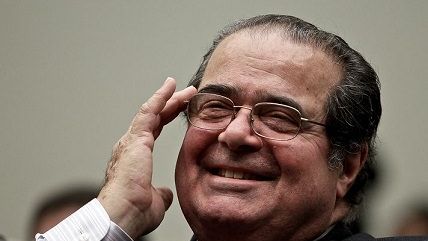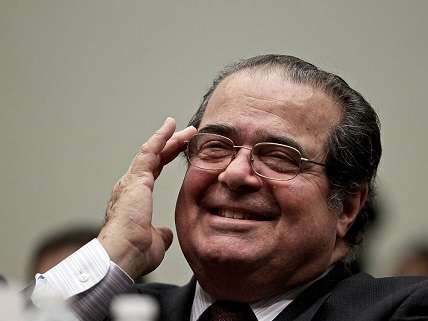Scalia's Angry, Incoherent Gay Marriage Dissent
An uncertain friend to libertarians.


Yesterday, Associate Supreme Court Justice Antonin Scalia was a hero to libertarians and conservatives for his terrific dissent in King v. Burwell. Today, his dissent in Obergefell v. Hodges—the landmark case legalizing gay marriage in all 50 states—should remind libertarians that he is an inconsistent friend.
In his gay marriage dissent, Scalia laments that the majority decision gives the Supreme Court legislative super powers that subjugates the democratic system to the will of the nine justices:
This is a naked judicial claim to legislative—indeed, super-legislative—power; a claim fundamentally at odds with our system of government. Except as limited by a constitutional prohibition agreed to by the People, the States are free to adopt whatever laws they like, even those that offend the esteemed Justices' "reasoned judgment." A system of government that makes the People subordinate to a committee of nine unelected lawyers does not deserve to be called a democracy.
But "the people"—as represented by their legislatures, I suppose—are subordinate to a committee of nine unelected lawyers when they pass laws that strip individuals of their right to equal treatment under the law. Just yesterday, Scalia argued that the Court was perfectly entitled to tell U.S. Congress that its democratically-enacted healthcare law was nonsensical. But today, the Court must defer to the democratic process?
The greater inconsistency, of course, belongs to Chief Justice John Roberts, who wrote the majority decision in King but dissented in Obergefell. For Roberts, the Court is expected to meekly submit to the stated will of Congress when it comes to Obamacare, but must stand athwart history, in opposition to equal rights, when it comes to gay marriage. [Update: Reason's Damon Root tells me that this isn't a contradiction of his judicial philosophy: He consistently favors the Court deferring to democratically-accountable state legislatures.]
Scalia makes clear that he does not see marriage as a right or a freedom, in mean-spirited and incoherent fashion:
The opinion is couched in a style that is as pretentious as its content is egotistic. It is one thing for separate concurring or dissenting opinions to contain extravagances, even silly extravagances, of thought and expression; it is something else for the official opinion of the Court to do so.22 Of course the opinion's showy profundities are often profoundly incoherent. "The nature of marriage is that, through its enduring bond, two persons together can find other freedoms, such as expression, intimacy, and spirituality."23 (Really? Who ever thought that intimacy and spirituality [whatever that means] were freedoms? And if intimacy is, one would think Freedom of Intimacy is abridged rather than expanded by marriage. Ask the nearest hippie. Expression, sure enough, is a freedom, but anyone in a long-lasting marriage will attest that that happy state constricts, rather than expands, what one can prudently say.) Rights, we are told, can "rise . . . from a better informed understanding of how constitutional imperatives define a liberty that remains urgent in our own era."24 (Huh? How can a better informed understanding of how constitutional imperatives [whatever that means] define [whatever that means] an urgent liberty [never mind], give birth to a right?)
Wait: Scalia thinks intimacy and spirituality are not freedoms? Does that mean he would deem it constitutional for legislatures to strip Americans of these things, and for the Court to do nothing to stop them? Holy judicial restraint, Batman!
The majority decision is "hubris," he concludes:
Hubris is sometimes defined as o'erweening pride; and pride, we know, goeth before a fall. The Judiciary is the "least dangerous" of the federal branches because it has "neither Force nor Will, but merely judgment; and must ultimately depend upon the aid of the executive arm" and the States, "even for the efficacy of its judgments."26 With each decision of ours that takes from the People a question properly left to them—with each decision that is unabashedly based not on law, but on the "reasoned judgment" of a bare majority of this Court—we move one step closer to being reminded of our impotence.
Full decision here.
Stay tuned for further analysis of Obergefell.


Show Comments (311)